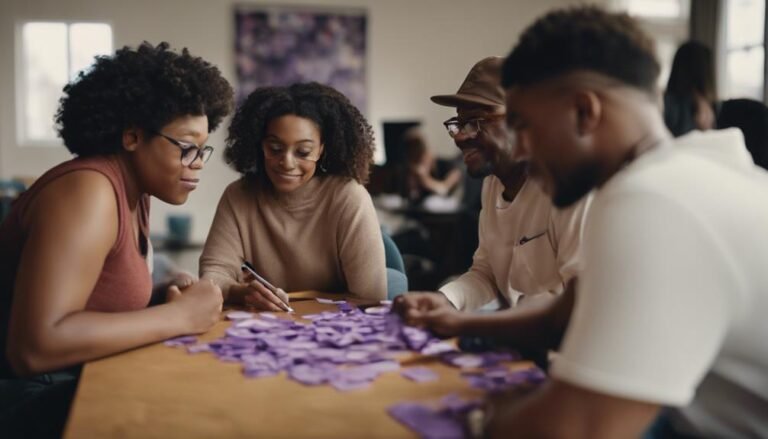In the journey towards healing for survivors of trauma, finding hope is essential. Trauma wounds deeply, affecting our emotional well-being and sense of self. Self-care practices like mindfulness and rest are important for nurturing mental health. Prioritizing well-being in all aspects empowers us to navigate challenges. Having support from a compassionate community is fundamental for our healing journey. Hope for Survivors serves as a beacon of assistance for survivors, offering resources and empowerment. Remember, healing is possible, and you are not alone in this journey towards wholeness.
Key Takeaways
- Providing a safe space for survivors to share their experiences without judgment.
- Offering access to mental health resources and domestic violence support.
- Empowering survivors through guidance, encouragement, and support.
- Creating a compassionate community for survivors to connect and feel valued.
- Guiding survivors towards healing and recovery with a 24/7 hotline for assistance.
Recognizing Trauma’s Impact
Understanding the profound impact of trauma is essential for survivors on their path to healing and recovery. Survivors of sexual violence often carry deep emotional wounds that can make them feel small and voiceless. The effects of such trauma can manifest as anxiety, depression, and a profound sense of violation, making it challenging to feel safe and maintain emotional well-being. It’s vital to recognize that traumatic events can shatter an individual’s sense of identity, self-worth, and ability to form healthy relationships.
As we walk alongside survivors, it’s important to acknowledge the weight of their experiences and offer a safe space for them to express their feelings. By validating their emotions and experiences, we help survivors begin to rebuild their sense of self and find hope for the future.
Together, we can support survivors in understanding that healing is a journey and that they aren’t alone in their struggle.
Emphasizing Self-Care Practices

Let’s explore the importance of emphasizing self-care practices as a key aspect of supporting survivors on their journey to healing and recovery.
Self-care plays an essential role in nurturing mental health and emotional well-being for those who’ve experienced trauma. Engaging in activities like mindfulness, hobbies, or spending time in nature can help survivors manage stress and cultivate resilience.
Prioritizing self-care isn’t a sign of weakness but a demonstration of strength and self-compassion. It allows survivors to attend to their own needs and nurture their mental health.
Getting enough rest, eating nutritious foods, and practicing self-compassion are fundamental components of self-care that can aid survivors in their healing process. By proactively engaging in self-care practices, survivors can maintain their mental health, restore balance, and promote overall well-being.
Encouraging Well-Being Prioritization
Prioritizing the well-being of survivors is essential for fostering resilience and facilitating the healing process. As survivors begin their healing journey, it’s crucial to remember that well-being encompasses various aspects of their lives, including mental, emotional, physical, and spiritual well-being.
By creating a holistic well-being plan, survivors can better navigate the challenges of trauma and work towards overcoming their past experiences.
Encouraging survivors to prioritize their well-being involves empowering them to engage in self-care practices, seek support from trusted individuals or professionals, and participate in activities that promote healing.
Recognizing the importance of well-being can serve as a catalyst for survivors to take control of their healing process, promoting a sense of control and empowerment.
Supporting Survivors With Dedication

In our commitment to supporting survivors with dedication, we offer a range of resources and a compassionate community to aid in their healing journey. Survivors of sexual abuse deserve essential support as they navigate the challenges that come with their experiences. We acknowledge the courage it takes to share their stories and seek help, which is why our program is designed to provide guidance, encouragement, and empowerment every step of the way.
By offering a safe space for survivors to connect with others who understand their struggles, we aim to foster a sense of belonging and understanding. Through our dedicated support, survivors can find hope, healing, and resilience as they work towards reclaiming their lives. It’s vital to create an environment where survivors feel heard, valued, and supported without judgment.
Together, we can walk alongside survivors on their journey towards healing, offering a beacon of light in their darkest moments.
Beacon of Hope for Assistance
As we extend our hand of support to survivors, we stand as a beacon of hope offering assistance in their journey towards healing and recovery. For those who’ve experienced the trauma of human trafficking, Hope for Survivors provides a lifeline of support and empowerment.
Our organization understands the complex challenges survivors face and is dedicated to guiding them towards healing.
Through a range of services such as a 24/7 hotline, access to mental health resources, and domestic violence support, Hope for Survivors offers practical assistance tailored to individual needs.
We recognize the importance of creating a safe space where survivors can seek help without judgment, knowing that they aren’t alone in their journey.
Frequently Asked Questions
Why Is Hope Important in Healing?
Hope’s role in healing is paramount. It provides a guiding light through the darkest times, empowering us to set goals and take action. Studies consistently highlight hope as a key factor in well-being and quality of life for survivors.
Hope isn’t just a feeling; it’s a tangible tool that can be nurtured and strengthened. With hope as our compass, we can navigate the path to healing and resilience, no matter the challenges we face.
What Is the Healing Power of Hope?
Healing through resilience is a transformative process that empowers survivors to overcome trauma and rebuild their lives. By cultivating hope, individuals can navigate through challenges, find strength in adversity, and create a positive future.
The healing power of hope lies in its ability to inspire courage, instill determination, and foster a sense of purpose. Through resilience, survivors can tap into their inner strength, embrace their journey, and move towards a brighter tomorrow.
What Not to Say to Someone Recovering From Trauma?
When supporting someone recovering from trauma, it’s essential to be mindful of what we say. Avoiding triggers is key.
Never minimize their experience or blame them. Don’t pressure them to share details or invalidate their feelings. Unsolicited advice or quick fixes can do more harm than good.
Let’s offer our support by listening, being empathetic, and showing understanding. Together, we can create a safe space for healing to take place.
How to Find Hope After Trauma?
In our healing journey after trauma, finding hope is essential. It involves setting goals, believing in our ability to create a better future, and finding pathways to recovery.
Studies show that hope is a key predictor of well-being in trauma recovery. Resilience can be learned at any stage of life through the pathway of hope.
Increasing our levels of hope can lessen the impact of trauma. Learning to hope and overcome struggles is central to healing for survivors.
Can Finding Hope for the Hurting Help in the Healing Process for Survivors?
For survivors of trauma, finding hope for hurting individuals can be a crucial step in the healing process. The sense of optimism and possibility that comes with finding hope can provide the strength and motivation needed to navigate the journey toward healing. Through support, therapy, and self-care, finding hope can be a powerful catalyst for recovery.
Conclusion
Let's be the lighthouse in the storm, guiding survivors towards healing and hope. Together, we can weather the darkest of nights and emerge stronger than before.
Let's hold each other up, shining a beacon of light to lead the way towards a brighter tomorrow. Remember, you aren't alone in this journey.
We're here, standing strong together, ready to support and uplift one another on the path to healing.







